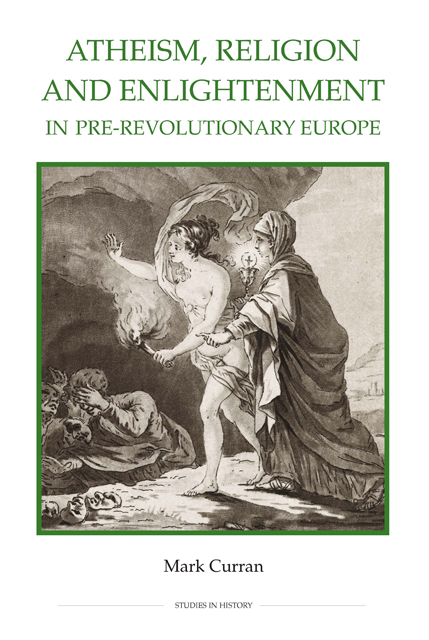Book contents
- Frontmatter
- Contents
- List of figures
- Acknowledgements
- Abbreviations
- Prologue
- Introduction
- 1 The virtuous atheist
- 2 The oral and written public sphere
- 3 Books and pamphlets
- 4 Periodicals
- 5 The philosophe response
- 6 Institutional reactions in France
- 7 The Christian Enlightenment?
- 8 Beyond the Christian Enlightenment
- Appendices
- Bibliography
- Index
1 - The virtuous atheist
Published online by Cambridge University Press: 14 February 2023
- Frontmatter
- Contents
- List of figures
- Acknowledgements
- Abbreviations
- Prologue
- Introduction
- 1 The virtuous atheist
- 2 The oral and written public sphere
- 3 Books and pamphlets
- 4 Periodicals
- 5 The philosophe response
- 6 Institutional reactions in France
- 7 The Christian Enlightenment?
- 8 Beyond the Christian Enlightenment
- Appendices
- Bibliography
- Index
Summary
Once upon a time, in the wooded hills surrounding the Lorranian Spa town of Contrexéville, the baron d’Holbach found himself in the embrace of three peasants, their eyes welling with tears of joy. His walking companion, our witness, had been given the slip, but had returned just in time to catch this tender farewell. Curious, he questioned the baron on the events that had come to pass. D’Holbach, in a gesture typical of his generosity, had just paid to free a poor young lover from his military obligations, bought an 800-franc property for the couple, and given three boxes of balm to the young man’s crippled father and a pot of the confection of hyacinth (often used in pre-modern medicine as an astringent) to his ill mother. The family were thanking him in the only way that they could: with their affection and gratitude. They lived, one assumes, happily ever after. The baron instructed his friend to speak not a word of the events to anybody; his charity was supposed to have been a private affair, and was the most enjoyable part of his travels. Plausible or otherwise, this anecdote, published just after d’Holbach’s death in the Journal de Paris for 12 February 1789, is in keeping with almost every piece of evidence that has survived concerning his life. Various accounts depict the baron as a perfect father and husband, a charitable and modest man and a formidable intellectual, even by the standards of the circles in which he mixed. He appears to have lived true to Rousseau’s depiction of him in Julie, ou la nouvelle Héloïse as M. de Wolmar, the virtuous atheist.
D’Holbach was born in the village of Edesheim, in the Rhenish Palatinate, in 1723. Little is known of his parents except that they both died when he was young, leaving his uncle to serve as his guardian. It was due to this uncle that at the age of twelve he moved to Paris, where he spent most of his life, becoming a naturalised Frenchman in August 1749. His fortune was partially inherited in 1753 when his uncle died, and fully in 1756 when his cousin, with whom he had shared his uncle’s fortune, also died.
- Type
- Chapter
- Information
- Publisher: Boydell & BrewerPrint publication year: 2012

